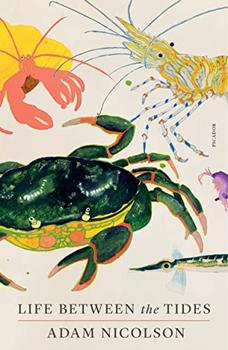Summary | Excerpt | Reviews | Beyond the Book | Readalikes | Genres & Themes | Author Bio

There is another side to it. The coming and going of the waters, their impermanence and unreliability, the sense in which the tide is a twice-daily catastrophe, has also played its part. In Applecross, on the west coast of the mainland of Scotland opposite Raasay, there is a bay called Ob'mhadaidh Ruaidh – the Bay of the Red Fox – from the story of a vixen that had been hunting on the shore who got her tongue deep into a large mussel, which closed on it, and held it while the tide rose and drowned her. Alexander Forbes, the early ethnographer who collected that story, also claimed that he had found a rat 'drowned with its paw under a large limpet and its body twisted up in a crevice whence it had been unable to free itself ', while Alexander Stewart, Victorian columnist in the Inverness Courier, found a 'dead kittiwake, but perfectly plump and fresh, lying on the top of a mass of drift tangle … One of its feet was firmly held in the vice-like grasp of a large mussel, the mussel in its turn being anchored by its byssus to a tangle root (Laminaria digitata) of immense size.'
The rising tide is unforgiving. This fluxing and flexing is a landscape, a halfscape, that reverberates with the mutability of things. It plays in our shared memory, part of 'the challenge the ocean always poses', as the American cultural critic Steve Mentz has said, 'to know an ungraspable thing'.
Some of the most famous lines ever written, Ariel's song near the beginning of The Tempest, embrace that shoreline ambiguity of perfection and destruction, the beautiful and the strange, the 'menace and caress' of the sea. These early moments in the play are themselves full of uncertainty: Ferdinand, the young prince of Naples, thinks his father the king is drowned, but we know he is not; these kings and princes are now homeless vagabonds on a storm-blasted shore; Ariel himself, the soul of poetry, is disguised not as a creature of the wind but as a little sea god and, as that watery spirit, sings the most untruthful and enigmatic of songs:
Full fadom fiue thy Father lies,
Of his bones are Corrall made:
Those are pearles that were his eies,
Nothing of him that doth fade,
But doth suffer a Sea-change
Into something rich, & strange:
Sea-Nimphs hourly ring his knell.
Burthen: Ding dong.
Harke now I heare them, ding-dong bell.
It is a hymn to the shore, afloat on 'sea-sorrow'; the king's body has become something like the floor of the sea. The colours of the shallow-deep waft over him. He is faded-rich. Encrusting jewels enshrine his head and his limbs transmute into submarine treasure. Everything that seems like threat and disaster is conjured here into masque-like glimmer. His corpse is a wonder of the wavering seas. And yet this is a song of death, an obsequy in which the elegance enshrines fatal loss, a drowning, a breaking of human connections, where the body is subject to the violence of the waves, and where sea nymphs ring the funeral bell. It is a place both of salt death and of scarcely imagined perfection. 'What care these roarers for the name of King?' the boatswain on their ship had cried as the winds had shrieked about them and now indeed the king has become treasure lying thirty feet down.
Sometimes, on a summer evening, when the tide is at full flood, and when, in the wonderful phrase Shakespeare used for this moment, it 'makes a still-stand', the whole of the bay outside the house goes quiet. Across the mile between its arms, a calm extends from headland to headland over what is, I reckon, about 300 acres of sea. If a fish moves anywhere in it, you can see that movement with your naked eye, the slightest stirring of its surface, a sleek molehill raised by the fish's tail and lit by the last of the sun. I have seen a sea trout on an evening like this, the best part of a mile away, reaching up out of the water, and thrashing back down on to it, in pure silence. Seconds later the sound of its arc and fall came over towards me. And magically, once, a basking shark cruised to and fro across the bay, twenty minutes to the east, twenty minutes back, lazy and easy, leaving behind it in that wide still sheet of water the triple wake made by nose, fin and tail, each dragging its own pink-lit pencil line across the calm.
Excerpted from Life Between the Tides by Adam Nicolson. Published by Farrar, Straus and Giroux. Copyright © 2021 by Adam Nicolson. All rights reserved.




I write to add to the beauty that now belongs to me
Click Here to find out who said this, as well as discovering other famous literary quotes!
Your guide toexceptional books
BookBrowse seeks out and recommends the best in contemporary fiction and nonfiction—books that not only engage and entertain but also deepen our understanding of ourselves and the world around us.